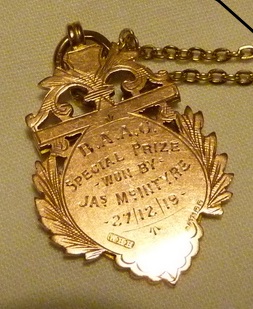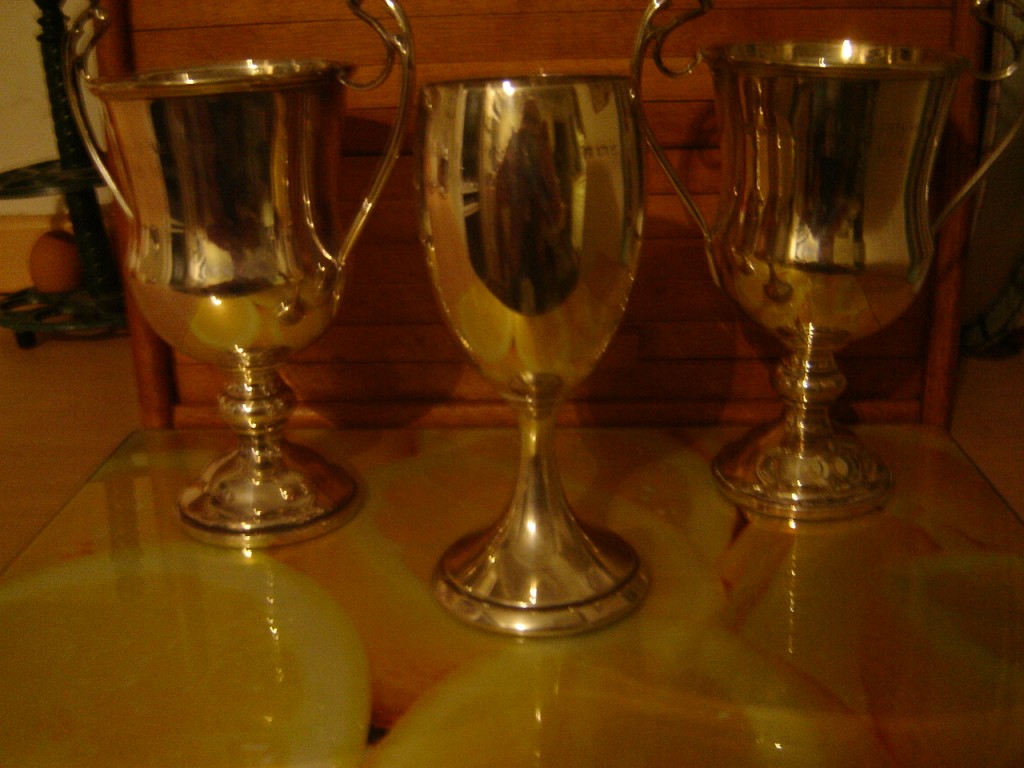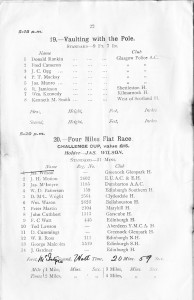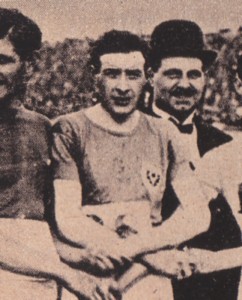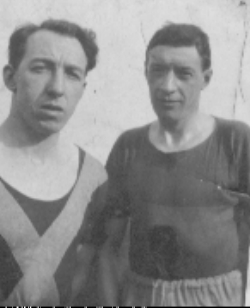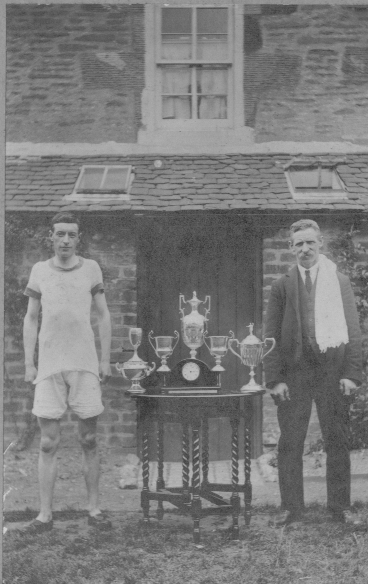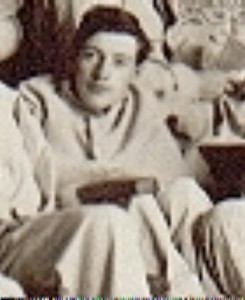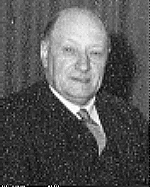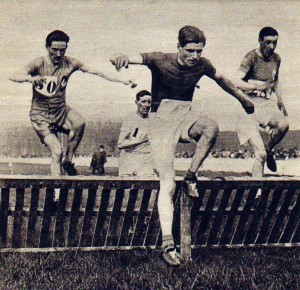 1923 International: McIntyre Number 28, on right, winner Blewitt is number 1 with
1923 International: McIntyre Number 28, on right, winner Blewitt is number 1 with
Belgian van der Broele in front was third, and the Frenchman Huest, No 50, was fourth
Photo from Alex Wilson
All through the history of athletics there are runners who have wonderful careers that just suddenly stop. Sometimes it is because of the demands of their career, sometimes because of injury or illness and many of course had their careers in the sport terminated by the start of one of the two great wars. James G McIntyre seemed to have had such a career – between 1921 and 1924 he won three 10 miles championships, had three wins and one second in the 4 miles championship, ran in two international cross-country championships in one of which he only lost first place in the last few strides and of course he ran many very good races at home. But as far as athletics historians were concerned, his career just stopped at the end of the 1924 track season. Right when he should have been at his peak. The question of why he stopped intrigued me. Then after this profile was published, his son made contact and filled in several of the gaps and provided more photographs.
Special Prize Gold Medal awarded to McIntyre in 1919
JG McIntyre began his athletic career with the newly formed Dumbarton AAC, founded immediately after the 1914 – 18 War, and the first time he was mentioned in Colin Shields’s excellent “Whatever The Weather” is after the 1921 Clydesdale Harriers Open Cross-Country race at Rouken Glen Park. This race is notable for the fact that 200 runners had to turn up to run the race twice after a farmer lifted the paper marking the trail and many of the competitors went off course, but it was won the second time round by JG McIntyre “then running for the newly formed Dumbarton AAC” Shields then goes on to point out that “his success in this and other events caused Shettleston Harriers to sign him to strengthen their team.”
Three of the trophies won by McIntyre in 1919
The summer of 1921 saw James McIntyre win the first of his three consecutive SAAA Four Miles titles when at Celtic Park on 25th June he defeated FC Watt to win in 20:59. The ‘Glasgow Herald described the victory – “The second surprise of the day was the victory of James McIntyre in the Four Miles, or to put it another way, the non-success of several more fancied men – WB Ross, John Cuthbert, the ten miles champion, and JH Motion, the cross-country champion, for example. McIntyre set a fast pace, and doubtless the sweltering conditions were responsible for the numerous retirements, as was the case in the ten miles two months ago.” Earlier in the season, on 4th June at Queen’s Park FC Sports, he had won the Mile in Dumbarton colours in 4 min 27 4-5th seconds from a mark of 60 yards by 20 yards from Russell of Paisley. The week before the SAAA win at Celtic Park, he won the Two miles race from Jimmy Wilson on the line – fantastic form to take into the Championships. His first appearance in the results columns after the SAAA Championship was on 30th July when he was placed third in the Open Two Miles race on a rainy afternoon at the Greenock Glenpark Harriers meeting at Cappielow Park off a mark of 35 yards. The longest race at Ibrox in the Rangers Sports the following Saturday was the Three Quarter Mile which was probably a bit short for him. More likely he was resting up because in the Celtic Sports the following week he not only ran in the Invitation Mile but actually won it by eight yards from a mark of 60 yards from no less a personality than A Hill (Polytechnic Harriers), scratch man, in 4 min 25 sec. The Celtic meeting was the end of the summer and the ‘Glasgow Herald’ listed all the meetin gs that year that had been cancelled due to the ‘industrial strife’. These included Kilmarnock Harriers, Vale of Leven FC, the Dumbarton AAC v Bellahouston Harriers at Dumbarton, Dumbarton Harp FC Sports and the St Vincent meeting at Celtic Park. ‘The blighting effect of industrial unrest’ on the sport was blamed for these and other meetings not going ahead. The programme below has him listed as ‘James McIntyre’ – apparently the ‘G’ was added to differentiate him from another talented runner from Garscube Harriers also called James McIntyre: they both ran in the same Scottish team in the internationals of 1923 in Maison-Lafitte, near Paris, and 1924 in Gosforth Park, Newcastle.
The unrest continued into the next summer season but McIntyre’s membership of Dumbarton did not – when he won his first SAAA 10 Miles Championship on 22nd April 1922, it was in the colours of Shettleston Harriers. “Held at Celtic Park on Saturday, by the favour of the directors of Celtic FC, distinction was lent to the the first of the season’s SAAA athletic championships by a record entry of 30 drawn from all parts of the country and including the cream of the devotees of cross-country running. Of the entrants only J Strain (Shettleston Harriers), T Hamilton (Bothwell Harriers), and H McLeod (Paisley YMCA) failed to answer to their names , and the runners had perforce to be drawn up in two rows. When the pistol was fired AB Lawrie (Garscube Harriers) at once dashed to the front but was soon displaced by JG McIntyre (Shettleston Harriers), the Scottish Four Miles Champion, who set such a fast pace that he was soon in possession of a clear advantage with JG Scott (West of Scotland Harriers) as his nearest attendant. The veteran A Craig (Bellahouston Harriers) from whom much was expected was soon tailed off, and after his retirement at one mile, it transpired that he was far from well. J Cuthbert (Garscube Harriers), who won last year, cracked before going two miles, and left the track in the eleventh lap. Meantime McIntyre had been advancing from strength to strength and he had the issue in safe keeping thus early. DM Wright (Clydesdale Harriers) forged into second place in the third circuit, closely followed by P Martin (Maryhill Harriers), and their positions were never disturbed. In the end McIntyre who put in a strong finish beat Wright by 250 yards with Martin third 150 yards behind the last named, being the only other competitor to gain a standard medal for beating 57 minutes. The winner’s time was 54 min 59 secs, Wright’s 55 min 55 1-5th sec and Martin’s 56 min 21 3-5th secs. The others to complete the course were:- D Farmer (Clydesdale Harriers) 58:02; AB Lawrie (Garscube Harriers) 58:30; B Dawson (Greenock Glenpark Harriers) 58:34.8; JG Scott (West of Scotland Harriers) 59:52.8; J Spence (Falkirk Victoria Harriers) 60:23.6; J Stronach (Grange Harriers) 63:01.
The winner’s mile times were as follows:- One Mile: 4 mins 56 sec; Two Miles: 10:19; Three Miles: 15:41.4; Four Miles: 21:10.6; Five Miles: 26:45; Six Miles: 32:21; Seven Miles: 38:00.8; Eight Miles: 43:41.2; Nine Miles: 49:23.2; Ten Miles: 54:59. “
He followed this up with a win from Dunky Wright (Clydesdale Harriers) in the 10 Miles Marathon at St Mary’s Charity Sports at Barrhead on May 15th for which no time was given. (It’s maybe of interest to note that third place was won by P Martin of Maryhill Harriers – Dunky in the course of his career represented all three clubs (Shettleston, Clydesdale and Maryhill) at one time or another). He did not appear in any other prize list – not even at the favoured Queen’s Park or Glasgow Police meetings – until the SAAA Championships at Powderhall on 24th June where he won the Four Miles from FC Watt in 20 minutes 0 4-5th seconds. This gained him selection for the Triangular International against England and Wales at Hampden on 8th July. Unfortunately he was suffering from a leg injury on the day and had to retire at three miles. In the Rangers Sports on the first Saturday in August, McIntyre was second in the Open Mile, four yards behind Duncan McPhee.
McIntyre’s best two cross-country seasons were to be 1922-3, and 1923-4. In the first of these he started the winter with first place in the Clydesdale Harriers Open Cross-Country race at Rouken Glen with the team finishing second to Garscube and followed this with a team victory at Maryhill. In January 1923, he was third in the West District Championships and then it was in to the National at Bothwell Castle where he was second to Dunky Wright. Twenty teams were forward for the race – 15 from the West and 5 from the East, to cover a three lap course. McIntyre was about 100 yards behind Clydesdale’s Wright and his efforts not only gained him selection for the international to be held at Maison-Lafitte near Paris, but also the National Junior title. The international that year was possibly the best race that he ever ran. The ‘Glasgow Herald’ report however ran to all of 14 lines. The winner of the race was CE Blewitt, the English champion who was ‘always up with the leading bunch’ and ‘sprinting he managed to beat McIntyre in the last 50 yards’ Among the other Scots to finish, W Nelson (WoS) was 23rd, Dunky Wright was 24th, AB Lawrie (Garscube) was 30th, J McIntyre (Garscube) was 32nd. It had been a very good winter’s work.
McIntyre with English champion Blewitt
In 1922 he had won the SAAA Four Miles and Ten Miles double, could he do it again and make it three Four Miles titles in succession? The international had been on the last Saturday in March and the Ten Miles was held at Hampden Park on the 21st April – almost exactly a month later. “Among the 18 competitors for the 10 Miles flat event appeared JG McIntyre (Shettleston Harriers) the holder of the title. At half distance the field was reduced to 12 runners, but all the interest was centred on McIntyre and P Martin (Maryhill Harriers), who held a commanding lead and in a spirited finish McIntyre retained the honour, beating Martin in the final sprint to the tape. The time recorded for the champion was 56 min 48 sec and Martin was the only other competitor to finish within the standard time of 57 min.” And that’s the report in its entirety. Nevertheless – 2 runs in the event, 2 wins. The Four Miles was to come up on 23rd June at Celtic Park, but there were races to be run before then. On 12th May, McIntyre was out at the St Peter’s AAC Sports at Celtic Park where he was second in the Open Mile where he was running from 30 yards, being defeated by Duncan McLean the Greenock policeman, running for Wellpark Harriers, off 75 yards who won in a time of 4 minutes 38 seconds. On 26th May, he ran in the Shettleston Harriers Open Sports Two Miles race where, ‘he was not concerned in the finish’ as the report had it. This was the meeting where schoolboy T Riddell made his appearance in the half mile and coming through 440 in 57 seconds, finishing in 2:04.4: taking this in conjunction with his running over a Mile the previous week, the reporter reckoned he was ‘a potential champion.’ The Queens Park Sports were always on the first Saturday in June, this was no exception and McIntyre was in action again. McIntyre and Shettleston won the Two Miles Inter-Harriers clubs individual and team race. His time was 9 minutes 33 4-5th seconds but he did not win without a battle against WGS Moor of Edinburgh University who ‘in the dash at the finish, could not live with the champion who won by 50 yards.’ Then all was quiet until the SAAA meeting where McIntyre duly won the Four Miles to make it three-in-a-row winning a grand race from WD Patterson of Edinburgh Southern and WH Calderwood of Maryhill in 20:55.4. There was virtually no report on the race although there was a comment that it was his best championship win. Again he was selected for the International to be held on July 14th at Stoke FC ground. Unfortunately he did not figure in the results which only extended to the first three runners and no reason was give. A pity because Scotland won the competition largely because of three victories by Eric Liddell.
Two weeks later he turned out in the Greenock Glenpark Sports in the Three Miles race where he ran from the scratch mark and was accordingly run out of the first three – he was giving the winner, Dunky Wright 88 yards, and the second placed W Nelson 150 yards – he could not give his two fellow internationalists such distances at that point when they were both featuring in the prize lists most weeks. Missing the Rangers Sports the following week he turned out in the Celtic Sports on the second Saturday in August and was in a ferocious race over two miles in front of an 18,000 crowd. The report read: “The most thrilling event was the two miles invitation,the finish of which will live in the memory of all present as the most thrilling of the season. JG McIntyre, CE Blewitt and CH Johnston virtually hurled themselves at the tape almost simultaneously, the judges placing these runners in the order named.” The result was 1. JG McIntyre (Shettleston) 60 yards; 2. CE Blewitt (Birchfield H) scratch; 3. CH Johnston (Glasgow University) 60 yards. Time 9 mins 35.4. Blewitt was of course the English champion and the man who had just out-sprinted McIntyre in the International in France in March so it must have been rewarding for him to gain that particular scalp.
That was where McIntyre ended the summer season of 1923 and it was on to the cross-country for winter 1923-4. Dunky Wright moved from Clydesdale Harriers that same winter and immediately became the top man in the club. McIntyre ran less than the previous winter, missing even the District championship, but turned out in the National where Dunky Wright won and McIntyre was second Shettleston runner home in sixth place which again earned him selection for the International, to be held that year at Newcastle. He was second scoring runner for his country in the international as he had been for his club in the national – finishing position 17th.
The Ten Miles was back at Celtic Park on 19th April, 1924, and McIntyre won his third successive championship – this time in 54:57.8. The ‘Glasgow Herald’ report read: “Of the 20 entrants for this race there were 16 starters. The four absentees were J McIntyre (Garscube), HFC Watt (West of Scotland), D Henderson (Edinburgh H) and JB Storrar (Edinburgh Southern Harriers). Right away the holder of the title took the lead, which he retained, with WH Calderwood at his elbow for 6.5 miles. At this point D McL Wright, the cross-country champion, who had been having a bad time, made a fine recovery and took the lead. Thereafter ensued a great duel between Wright and McIntyre for Calderwood tailed off, Just as the leaders were completing the ninth mile, McIntyre stumbled and fell heavily. Wright who was running alongside at the time stopped and assisted the champion to his feet. This fine sporting action, which was loudly cheered, possibly cost Wright the championship, for in the final straight McIntyre’s superior finishing powers carried him home by about 20 yards.
The intermediate times were: One Mile: 4 mins 59 3-5th sec; Two Miles: 10 min 21 sec; Three Miles: 15 mins 46 3-5th secs; Four Miles: 21 mins 14 2-5th secs; Five Miles: 26 min 50 sec; Six Miles: 32 min 30 4-5th secs; Seven Miles: 38 min 15 secs; Eight Miles: 43 min 50 sec; Nine Miles: 49 mins 29 4-5th sec; Ten Miles: 54 mins 57 4-5th sec.
Results: 1. J McIntyre (Shettleston Harriers); 2. D Wright (Shettleston Harriers); 3. WH Calderwood (Maryhill Harriers). Won by 20 yards, fully 100 yards between second and third. The standard time was 57 minutes and J Gardner (Edinburgh Harriers) and D Quinn (Garscube Harriers) qualified for standard medals. The form showed was above the average, for the conditions were against fast times. A feature was the number of competitors who completed the distance.”
McIntyre did not appear too often in the results and the press report on the Civil Service Championships at the end of May commented on his absence making the race a comfortable one for J Gardner of ESH who won the Mile in 4:49, and although the Shettleston Harriers Sports were held the following week, he did not appear in the results there either. He did appear on 7th June however in the Two Miles team race at the Queen’s Park Sports and won by three yards in 9 minutes 57 seconds. The SAAA Championships were held on 14th June at Hampden Park and after three wins in the Four Miles, the best that he could do was finish second to CH Johnston (Edinburgh University) who won in 20 min 32 1-5th secs. This was the last race for which JG McIntyre was noted in the published results – not the Greenock Glenpark Sports, not the Rangers Sports nor in any other meeting that summer.
With Trophies and Trainer
Where had he gone? The Shettleston Harriers history rather churlishly surmises –
“The club would be without one of its key runners for the 1924-5 season. James McIntyre had decided that his talents merited more than the regular medal, shield or canteen of cutlery. As ‘The News’ put it, “he has forsaken the amateur for the professional track.” The professionals regarded him as a ‘decided acquisition’ but he had a very short career. After a few successes in minor events, he retired from athletics. His best recorded performance at a pro event was 9:37 from scratch position in a two mile race at Powderhall in October 1924.”
That was not quite how the rest of the Scottish athletics saw his move from the amateur ranks. Page 200 of “Powderhall and Pedestrianism” says that he turned pro in a fit of pique after the decision went against him in that last SAAA Four Miles Championship. Apparently the race ended in a near dead-heat between himself and Johnston with both men being given the same time of 20:32.5. Alex Wilson, an authority on the period, checked this out with ‘The Scotsman’, and it says that Johnston was given the nod, all judges being in agreement on the matter. McIntyre was not satisfied with this and left the amateur ranks while Johnston was later selected to run in the Paris Olympics where he ran in the 5000m. This is borne out in comments by his son, James, who says:
“My sister was born at the end of 1923, so he held both four and ten titles during her first year and was no doubt looking forward to holding on to them as the selection for the 1924 olympics in Paris would rest on them and other results. The race is well documented in the newspapers of the day and ended in a tight finish which my dad always insisted he had won although the verdict of the judges eventually went against him after several had changed their minds. My father always insisted that there was no winning tape put across. (This would be important to him for I have seen a photo of another dead heat finish between him, English champion Blewitt and a French champion. On that occasion the verdict went in favour of my father because in the photo he was holding the tape). Following the race and the uproar that followed, there were several conflicting newspaper reports. Some said that, because of the dispute neither would by considered for the Olympics but, by the Monday evening papers, it was declared that BOTH would be in the frame. He never went to Paris and, in the end, turned his back on the sport. It must be remembered that his rival was a university student who would have had a leisurely approach to the big day while my father was a working postman (the press called him the running Cardross postman) who had been up at four am and done a full day’s work prior to the race. So what made him go? Class differences….new born first child….grievance at verdict on his most important race…lure of big money? Who knows?”
So there you have it: he turned pro at the very top of his game. He was not mentioned in the ‘Fifty Years of Athletics’ published in 1933 other than as winner of the six championships; there was no mention of him in the text. For the SAAA, the amateur code was sacrosanct, to turn pro was to be cast into the outer darkness. From his point of view, he may have been promised something to make the burning of his boats worth while, or he had not done his homework since it was clear that no one save for a few heavies could make a living from the sport. It may be of course that any money earned in the dark days of the Twenties Depression was essential. We know nothing about his personal circumstances at the time and it would be wrong to judge his action. We must surely regret the loss of this talent from the sport.
His son James tells us that “His professional career was brief but not without its triumphs. He is still the only runner ever to win a distance race from a scratch position in the history of Powderhall. And he once won a prize money of £75 during the depression him mid 1920s. The runner up only got a couple on quid. I believe he used his share of the money, after expenses, to buy a home for his parents.”
Wounded near the end of WW1
He goes on to tell us that “I believe his greatest ever day came about five years earlier in 1919 while he was still serving in Germany in the Machine Gun Corps. On that one day towards the end of the year he won three…and probably four…events. I have the silver cups he won at the half mile, the mile and the cross country all on the same day at the MGC sports. There was also a silver rose bowl which went elsewhere in the family and, on my sister’s death in 2013 her daughter produced a solid gold medallion engraved “BAAA special prize December 27, 1919” which may refer collectively to that day’s achievements.”
His father, despite having left the amateur ranks behind, never really lost the friends and contacts made – I find it inconceivable on a personal level that that could happen. But in McIntyre’s case, he retained many friend ships, most notably with Eric Liddell and his son remembers Liddell visiting the family home on one of his last home leaves from China. He also recalls sitting with his Dad and McDonald Bailey at the top table at a Highland Games dinner. The athletics friendships remained.
James McIntyre married twice and both his wives died in their early forties. He continued to work for the post office and, having started out at a telegram boy he ended up as Chief Postal Inspector of the county of Dunbartonshire. He died in 1970, aged 73, leaving a son and a daughter and four grand-children.
